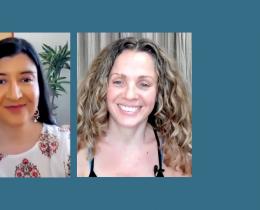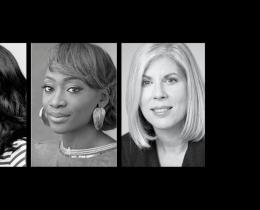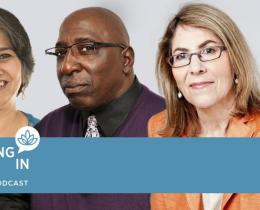Omega: You’ve noted that Yemen is a “young” country—most of the population is under 15 years old. Right now is a pivotal time for the future of the nation, as change accelerates in a short time. How has it felt to step into that history politically as one of the only women in a position of political authority?
Nadia: As the first female Minister of Information I faced huge challenges, expectations, and pressure. I belong to what is known as the "Professional Government' indicating the fact that many of us came from professional walks of life especially from the private sector. I was among the youngest ministers and in fact, this has been a trend for me in my career generally; to be one of, if not the youngest and usually the only woman in the room of high level officials and decision makers. I see myself as an inspiration for young women who are fed up with how things are and want to dive in, take matters into their own hands, and create change.
However, my government wanted to achieve much without many resources or solid institutions to run. There was a lot of resistance and people are used to corruption and lack of accountability. If we have to build from scratch, I’m up for it. But the resistance is disturbing.
Omega: What does leadership mean to you?
Nadia: When I started running the Yemen Times [as the first female editor-in-chief] I was challenged at the professional level. I was maybe the first woman boss many of my staff had experienced. Journalism is a difficult field, and here I was telling people what to do. I’d worked for Oxfam in development before this, but it was a great challenge. I fired about half of the male staff in the first year and hired women and young men to create a more gender balanced and energetic newsroom.
What I understand about leadership is that you have to lead, of course, but you also have to follow. You have to listen, sometimes taking things at face value. You have to be willing to make mistakes and be naïve.
Omega: What strategies do you have for practicing boldness?
Nadia: Consistency is an important element. Stepping in again and again and again. Challenging yourself, taking risks, and allowing yourself to be wrong. Women tend to be so scared of making mistakes—thinking that they will reflect badly on all women. I have always tried new things, and failed miserably in some. The most important thing here is to learn from mistakes and rise up again.
I am not an average Yemeni women as I was lucky to have the opportunity to travel and see the world. I studied abroad in India where I availed a computer science engineering degree then in Britain where I did my Masters in Information Systems Management and where I am doing my PhD in Politics and Media currently. I have been privileged to travel a lot and study different long and short courses and interacted with many people from various backgrounds.
This gave me a great deal of exposure and a different perspective on life. I have learned to accept people for who they are and try to identify common ground instead of differences. Also, never to forget that alongside the ambition and limelight one has to think about family and taking care of the people who are closest to you. I try to balance family and public life and not make a choice between being a mother, wife, or career woman.
Omega: What gives you strength?
Nadia: Like-minded people where I can seek support and advice. My husband and my family. I also feel very concerned for my children. I became involved because I want my daughter and son to have a better life. I tell myself—there is still hope and we must take baby steps, and each has to do his or her own role in order to ensure a better future for those to come. Just like how I owe it to my father and mother who raised me well and empowered me to become the person I am today, I need to do what’s right for the next generation. If I stop and others stop, think about what my country and even the world will miss out on.
Support from institutions like Omega and events like Women & Power are important and help me emotionally and morally, because they represent a community that cares.
Omega: What do you think is the biggest hope Yemeni women have for their future?
Nadia: Yemeni women are survivors by nature. They'd carve mountains and turn them into homes if needed. But I believe their biggest hope comes from role models who are real and grounded. Women who made it happen for themselves and are not living in ivory towers isolated from the rest of the crowd. Also support groups, especially including men, are essential for any woman to succeed.
Omega: Have the Yemeni women, who were so active during the Arab spring, been able to respond to the current political and economic situation with some continued agency?
Nadia: Unfortunately the tide of political unrest was much stronger than the positive cultural change occurring due to the revolutions. It has been very difficult to hold onto the achievements we had made whether in 2011 or in the National Dialogue Conference in 2013-2014, which gave Yemeni women their biggest political achievement yet: a 30 percent quota in all elected and nonelected decision making positions.
When in times of conflict, men take over exclusively and push the women's empowerment agenda aside. I have heard it with my own ears from a very high level position politician recently when I demanded there should be women involved in the peace process of Yemen today… you know what he said? He cynically brushed off my demand saying: "forget your women nonsense now, we have more important matters at hand."
But do we give up? Of course not, we fight back and fight viciously because if women's empowerment is not a priority for men, it should be so for women.
Omega: How can the rest of the world best support Yemen right now?
Nadia: To start with, the world should come together in order to facilitate and deliver relief and humanitarian assistance to the 21 million Yemenis in need of urgent humanitarian support.
For me, personally, I need my global community, who has always been supportive, to demand that human rights, press freedom, and gender equality are not ignored while politicians decide on how to work their issues. Let's advocate and demand that women's issues do not fall through the cracks.
Omega: What sustains you?
Nadia: It is taking time to be with my family, enjoying the silliness of my little children, and having a good laugh with the ones you love. I also enjoy retreats and quality events that allow for spiritual introspection but those are really hard to come by.



